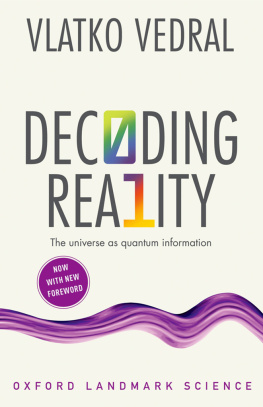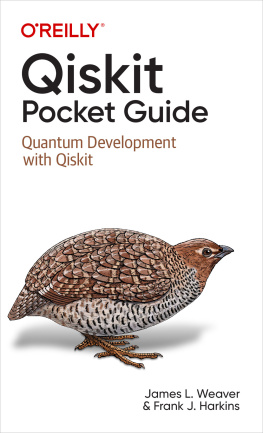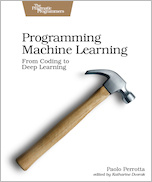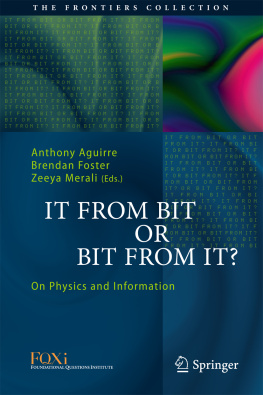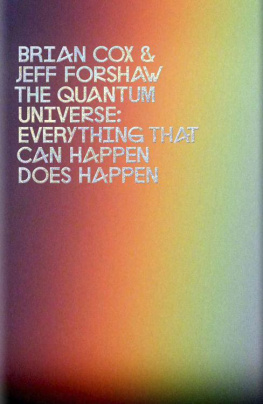DECODING REALITY
Vlatko Vedral studied undergraduate theoretical physics at Imperial College London, where he also received a PhD for his work on Quantum Information Theory of Entanglement. Since June 2009, Vedral moved to Oxford as Professor of Quantum Information Science. He also holds a professorship in physics at the National University of Singapore. Throughout his career Vedral has held a number of visiting professorships at different international institutions. He has published more than 170 research papers and has written two undergraduate textbooks. He has frequently written for popular science journals and major daily newspapers, as well as having done extensive radio programmes and television interviews.
PRAISE FOR DECODING REALITY
An engaging, non-technical exploration of what the new theory of quantum information and computation tells us about life, the universe, and everything.
David Deutsch, author of The Fabric of Reality
Let Vedral guide you skilfully through the wonderland of modern physics where nothing is as it seems. This is the finest treatment I have read of the weird interplay of quantum reality, information and probability.
Paul Davies, author of The Eerie Silence and The Goldilocks Enigma
How [do we] define information. Most of us have a rough idea. Vedral has a very precise, scientific definition: it is the logarithm of the inverse of the probability of an event. Or, more simply, the more unexpected an event, the more information it contains.
Financial Times
Vlatko Vedral, an Oxford physicist, examines the claim that bits of information are the universes basic units, and the universe as a whole is a giant quantum computer. He argues that all of reality can be explained if readers accept that information is at the root of everything. So what is information? Mr Vedrals notion of information is not the somewhat fuzzy concept most people have of it, but a precise mathematical definition.
The Economist
DECODING REALITY
The Universe as Quantum Information

VLATKO VEDRAL
University of Oxford, England and National University of Singapore, Singapore


Great Clarendon Street, Oxford, OX2 6DP,
United Kingdom
Oxford University Press is a department of the University of Oxford. It furthers the Universitys objective of excellence in research, scholarship, and education by publishing worldwide. Oxford is a registered trade mark of Oxford University Press in the UK and in certain other countries
Vlatko Vedral 2010
The moral rights of the author have been asserted
First Edition published 2010
First published in paperback 2012
Second Edition, as Oxford Landmark Science 2018
Impression: 1
All rights reserved. No part of this publication may be reproduced, stored in a retrieval system, or transmitted, in any form or by any means, without the prior permission in writing of Oxford University Press, or as expressly permitted by law, by licence or under terms agreed with the appropriate reprographics rights organization. Enquiries concerning reproduction outside the scope of the above should be sent to the Rights Department, Oxford University Press, at the address above
You must not circulate this work in any other form and you must impose this same condition on any acquirer
Published in the United States of America by Oxford University Press 198 Madison Avenue, New York, NY 10016, United States of America
British Library Cataloguing in Publication Data
Data available
Library of Congress Cataloging in Publication Data
Data available
ISBN 9780199237692 (Hbk.)
ISBN 9780192554253 (Ebk.)
Links to third party websites are provided by Oxford in good faith and for information only. Oxford disclaims any responsibility for the materials contained in any third party website referenced in this work.
Dedicated to my mother the pain from her absence is only marginally alleviated by my (imperfectly encoded) memories of her.
CONTENTS
M uch has happened to the world of quantum information since I wrote this book more than seven years ago. We have had an explosion of activities all aimed at building a quantum computer. Google, Microsoft, IBM, and many other major companies are investing in various technologies to support stable quantum bits. There are many startups, most of which are not surprisingly in the Silicon Valley, all joining the race to make the first large-scale quantum computer. The bets currently are with three different implementations: superconductors, cold atoms, and photons.
The times are clearly even more exciting for quantum information as various governments are also joining forces: the United Kingdom has invested 280 million pounds in a number of Quantum Hubs and the European Union has earmarked a billion euro flagship project to develop quantum technologies. The strong international players outside of Europe and the USA are Singapore (where I spend a great deal of my research time at the Centre for Quantum Technologies), Australia, Canada, and now, China. On top of pursuing quantum computers, China has been developing various quantum satellite technologies and this alone has been a major new trend since the first publication of Decoding Reality.
The industrial attitudes have changed so much that quantum computers are now seen as more or less inevitable at some point in the not so distant future. But while the technology landscape has dramatically changed, the most important thing, however, has not changed at all. This is the fact thatas I argue in this bookthe most fruitful way of viewing reality is still as being made up of quantum bits of information. If anything, this thesis that the most fundamental aspect of reality is information, and not energy or matter, is now even more forcefully apparent than ever before. And it might even be at the core of our next fundamental theory of reality, which will merge quantum theory and gravity in a unique corpus of laws.
When Decoding Reality first appeared in 2010, it wasto my surpriseconsidered controversial in some circles. I think it will be much less so now. I do hope, however, that this does not diminish the enjoyment the reader might have when learning about some fun aspects of science as seen through the eyes of a quantum information practitioner like myself.
Vlatko Vedral, Oxford, July 2017
T here are a number of people who should be thanked and without whom this book would not have existed. I have been influenced by many researchers in the past 15 years of my research career. In alphabetical order those who did most are Janet Anders, Charles Bennett, Sougato Bose, aslav Brukner, Keith Burnett, David Deutsch, Artur Ekert, Peter Knight, William Wootters, and Anton Zeilinger. They will find much of themselves in the pages of this book.
I would like to thank the departments of physics at the Universities of Oxford and Leeds, UK, and the National University of Singapore who have provided me with a great environment encouraging scientific debate and giving me a better opportunity to communicate science to a wider audience.

